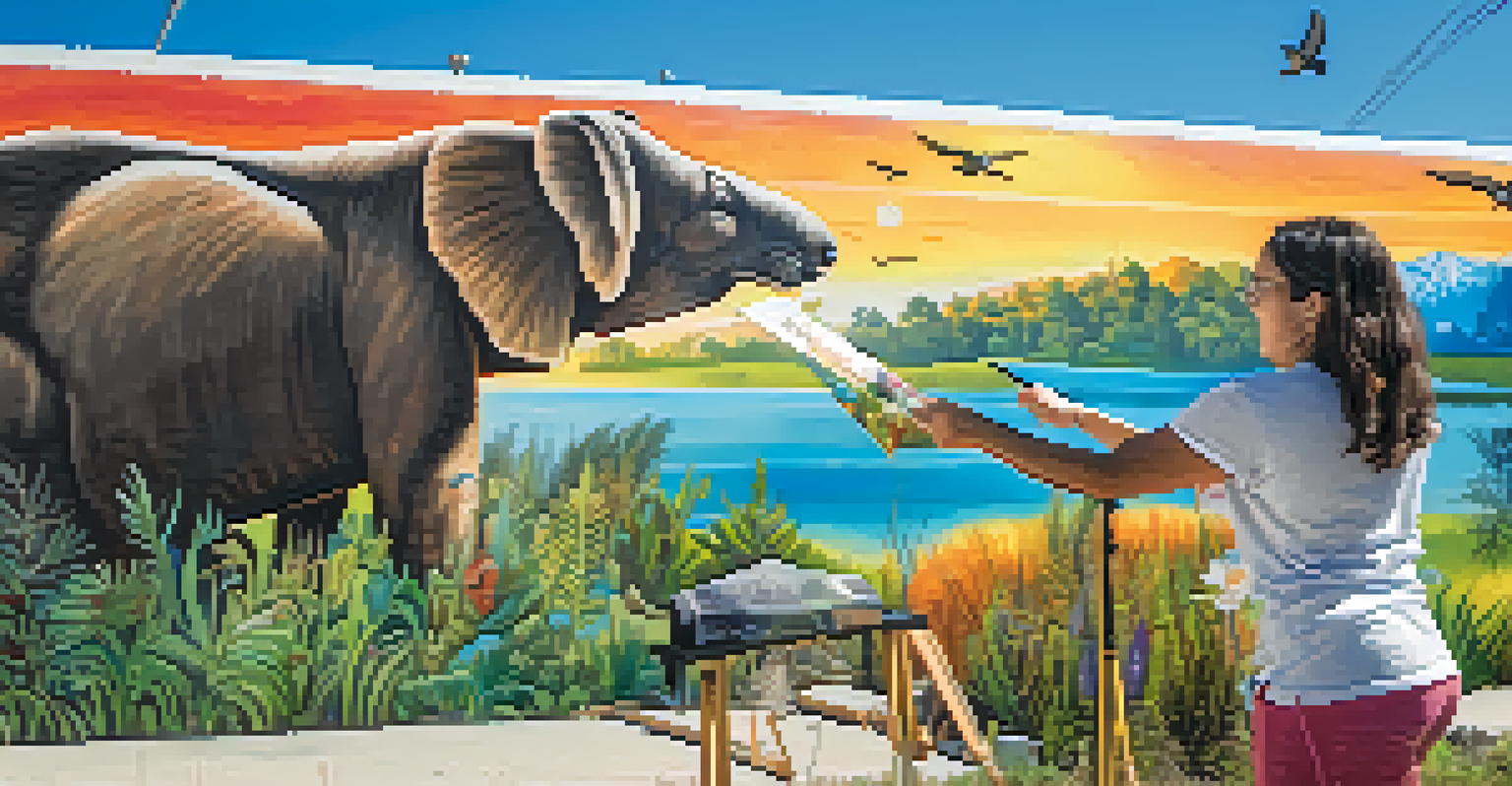How Volunteer Tourism Impacts Brazil's Local Ecosystems

Understanding Volunteer Tourism and Its Appeal
Volunteer tourism, often called 'voluntourism', combines travel with community service, attracting many eager to make a difference. Travelers not only engage with local cultures but also contribute their time and skills to various projects. This unique form of tourism appeals especially to those seeking meaningful experiences, allowing them to connect deeply with the places they visit.
Traveling – it leaves you speechless, then turns you into a storyteller.
In Brazil, the vibrant ecosystems and rich biodiversity draw many volunteers. They often participate in conservation efforts, such as wildlife protection or habitat restoration. This hands-on involvement fosters a sense of responsibility and awareness about environmental issues, making the travel experience both enjoyable and impactful.
However, while volunteer tourism can be beneficial, it’s essential to approach it thoughtfully. Not all programs are created equal; some may prioritize profit over genuine impact. This highlights the importance of researching organizations to ensure their commitment to sustainable practices.
Positive Contributions to Local Ecosystems
One of the most significant benefits of volunteer tourism is the direct contribution to local ecosystems. Volunteers often engage in activities such as reforestation, wildlife monitoring, and habitat restoration, which can significantly enhance biodiversity. For instance, programs that focus on planting native trees help restore degraded areas, benefiting both wildlife and local communities.

These projects not only improve the environment but also raise awareness among local residents about conservation efforts. Volunteers often share their experiences and knowledge, fostering a culture of sustainability. This exchange of information can lead to long-term positive changes in how communities interact with their natural surroundings.
Volunteer Tourism's Positive Impact
Volunteer tourism contributes to local ecosystems through conservation efforts and community development.
Moreover, the economic support generated by volunteer tourism can fund further conservation initiatives. When volunteers pay for their trips or contribute financially to projects, it creates a sustainable funding source that can be reinvested in local ecosystems. This cyclical benefit reinforces the connection between tourism, conservation, and community development.
Challenges Posed by Volunteer Tourism
Despite its benefits, volunteer tourism also presents challenges that can impact local ecosystems. In some cases, the influx of tourists can lead to overcrowding in sensitive areas, putting pressure on resources and wildlife. This phenomenon can disrupt natural habitats and alter the delicate balance within ecosystems, leading to unintended consequences.
The greatest threat to our planet is the belief that someone else will save it.
Additionally, poorly managed volunteer programs may not align with local needs or conservation goals. When projects are designed without input from local communities, they might inadvertently cause harm. For instance, introducing non-native species in an attempt to beautify an area can threaten indigenous flora and fauna.
It's crucial for organizations to implement sustainable practices and assess the long-term impacts of their initiatives. Community involvement and ongoing evaluation can help mitigate adverse effects, ensuring that volunteer tourism contributes positively to Brazil's rich ecosystems.
Cultural Exchange and Environmental Awareness
Volunteer tourism fosters a unique cultural exchange that benefits both travelers and locals. Volunteers often stay in communities, learning about local customs, traditions, and environmental challenges. This immersive experience not only enriches their understanding but also promotes respect for cultural diversity.
As volunteers engage with local populations, they often become advocates for environmental awareness, spreading knowledge beyond their immediate experiences. Conversations about conservation can inspire local communities to take action, creating a ripple effect that extends far beyond the volunteer’s stay.
Challenges in Volunteer Programs
Despite its benefits, volunteer tourism can lead to overcrowding and misalignment with local needs if not managed responsibly.
This cultural exchange reinforces the idea that environmental protection is a shared responsibility. By fostering connections between volunteers and locals, these experiences can lead to collaborative efforts in addressing environmental issues, creating a more sustainable future for everyone involved.
Long-Term Benefits for Local Communities
Volunteer tourism can lead to long-term benefits for local communities, particularly through infrastructure development. Many volunteer programs contribute to building schools, healthcare facilities, or eco-friendly tourism accommodations, which can enhance the overall quality of life. These improvements often have a lasting impact, benefiting both residents and future visitors.
Moreover, increased visibility of local environmental issues can lead to greater funding and support for conservation projects. The presence of volunteers often attracts attention from NGOs and governmental bodies, paving the way for more significant investment in local ecosystems. This can result in enhanced protection measures and resources for wildlife conservation.
As communities become more involved in volunteer tourism, they also gain skills and knowledge that empower them to take charge of their environmental stewardship. This capacity building can lead to sustainable practices that ensure the health of local ecosystems for generations to come.
The Role of Responsible Volunteer Organizations
Responsible volunteer organizations play a crucial role in ensuring that tourism positively impacts Brazil's ecosystems. These organizations prioritize sustainable practices, working closely with local communities to align their efforts with genuine needs. By emphasizing ethical tourism, they help mitigate potential negative effects while maximizing benefits.
Moreover, these organizations often provide training for volunteers, equipping them with the knowledge and skills necessary for meaningful contributions. This education not only enhances the volunteer experience but also ensures that projects are carried out effectively and respectfully.
Cultural Exchange Enhances Awareness
Engaging with local communities fosters cultural exchange and promotes environmental awareness among both volunteers and residents.
Transparency is another key aspect of responsible organizations. By openly sharing information about their initiatives, funding, and impacts, they build trust with both volunteers and local communities. This accountability fosters a collaborative spirit that enhances the overall effectiveness of volunteer tourism.
Future Prospects for Volunteer Tourism in Brazil
The future of volunteer tourism in Brazil looks promising, especially as awareness of sustainability continues to grow. More travelers are seeking authentic experiences that contribute positively to the places they visit, paving the way for innovative programs that prioritize environmental and cultural preservation. This shift in traveler expectations can lead to a more responsible approach to tourism.
Additionally, advancements in technology and communication are making it easier for organizations to share best practices and success stories. This knowledge exchange can enhance the effectiveness of volunteer programs, ensuring they are adaptable and responsive to local needs. As communities and organizations collaborate, the potential for impactful projects increases.

Ultimately, the continued evolution of volunteer tourism can lead to significant benefits for Brazil's local ecosystems and communities. By prioritizing sustainability, ethical practices, and genuine engagement, volunteer tourism can become a powerful force for positive change.